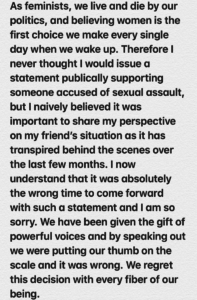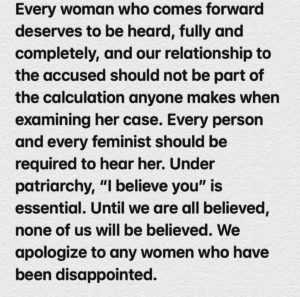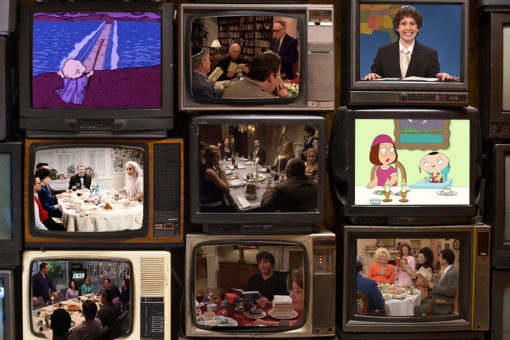I admit, I was never a fan of Lena Dunham. And yet, I would try to be diplomatic whenever the latest Dunham-scandal would make the news (as much as I could, at least, hoping she would grow up and get out of her bubble). To me, it’s always been painstakingly obvious that Dunham suffers from the rich white girl complex, playing the role of an activist — a kind of activism that fell short, because it mostly was self-serving and self-focused. It typically didn’t help anyone but her own career.
Dunham’s latest comments regarding actress Aurora Perrineau’s sexual assault accusations against Girls writer Murray Miller, however, have officially crossed the line — not just with me, but with many. It’s hard to give a self-described feminist and survivor-believer the benefit of the doubt when they publicly announce how they believe their male friend didn’t rape anyone — because it’s convenient not to believe when your friend does something wrong, as opposed to a gross man you don’t personally know.
Perrineau recently opened up about how Miller raped her when she was only 17 years old in 2012 (he was 35). She has now filed a police report accusing Miller of sexual assault, and the Los Angeles Police Department are currently investigating the case. Miller, of course, has denied the allegations.
As TheWrap first reported, Perrineau said she was with two friends when Miller asked one of them for a ride home “because he was drunk.” She described the incident, saying, “At some point, I woke up in Murray’s bed naked. He was on top of me having sexual intercourse with me. At no time did I consent to any sexual contact with Murray.”
This caused Dunham and Girls executive producer Jenni Konner to release a statement defending their colleague, as if that was necessary. By defending their friend, it automatically means they don’t believe a survivor and woman of color (which is ironic, as the duo founded Lenny Letter, which is a publication that is supposed to promote marginalized people, including women of color. Hypocritical much?).
In their statement, they said:
During the windfall of deeply necessary accusations over the last few months in Hollywood, we have been thrilled to see so many women’s voices heard and dark experiences in this industry justified. It’s a hugely important time of change and, like every feminist in Hollywood and beyond, we celebrate. But during every time of change there are also incidences of the culture, in its enthusiasm and zeal, taking down the wrong targets.
We believe, having worked closely with him for more than half a decade, that this is the case with Murray Miller. While our first instinct is to listen to every woman’s story, our insider knowledge of Murray’s situation makes us confident that sadly this accusation is one of the 3% of assault cases that are misreported every year. It is a true shame to add to that number, as outside of Hollywood women still struggle to be believed. We stand by Murray and this is all we’ll be saying about this issue.
What “insider knowledge?” Were they actually there when Perrineau was assaulted? Are they just believing the side of an alleged abuser because it’s easier — and he helped them?
I don’t even need to be a sexual assault survivor to feel the way I do (it should be common sense), but of course, as a survivor, Dunham’s words are especially ridiculous to me. I see through her. I have for a while.
This reaction is in stark contrast to Sarah Silverman’s recent response to Louis C.K.’s many incidents of assault — showcasing what to do and not to do. Silverman, unlike Dunham and Konner, acknowledged that while she is Louis C.K’s friend, that doesn’t mean she gets to simply excuse his behavior — or not believe his victims.
This difference means everything — we can admit how hard it is when people we love have abused others, but also how we can’t just “take their side” because of that love. That’s not how it works. If you believe survivors, you believe survivors. It’s not that hard, and while there are gray areas (like knowing and loving abusers, because abusers don’t mistreat everyone in their lives), we still need to acknowledge when abuse happens, even when we don’t see it.
Silverman worded her statement beautifully:
I wish I could sit this one out. But then I remembered something I said on this very show: that if it’s mentionable, it’s manageable. So I’m going to address the elephant masturbating in the room.
This recent calling out of sexual assault has been a long time coming. It’s good. It’s like cutting out tumors — it’s messy and it’s complicated and it is gonna hurt, but it’s necessary and we’ll all be healthier for it.
He wielded his power with women in messed-up ways. I could couch this with heartwarming stories of our friendship and what a great dad he is, but that’s totally irrelevant, isn’t it? Yes, it is.
It sucks, and some of our heroes will be taken down and we will discover bad things about people we like, or in some cases, people we love.
I love Louie. But Louie did these things. Both of those statements are true. So, I just keep asking myself, can you love someone who did bad things? Can you still love them? I can mull that over later, certainly, because the only people that matter right now are the victims. They are victims, and they’re victims because of something he did.
I believe with all my heart that this moment in time is essential. It’s vital that people are held accountable for their actions, no matter who they are. We need to be better. We will better. I can’t [expletive] wait to be better.
I’m including Silverman’s response here, because it’s necessary for all of us to see what real activism and support is — and what toxic feminism is and being unsupportive looks like. We are at a pivotal moment where we need to learn how to support each other better, and how to react when we find out someone we know and love abused someone else, when we find out anyone is abused.
Naturally, after the backlash, Dunham “apologized” for her statement, as if a belated apology covers up the fact that her feminism and activism is flawed — and that if she was truly a supporter, she wouldn’t have made a bullshit statement to begin with.
As Dunham says in her new statement released on Twitter:
— 💎 Lena Dunham 💎 (@lenadunham) November 19, 2017


Let’s also remember that time Dunham tweeted back in August 2017 this statement: “Things women do lie about: what they ate for lunch. Things women don’t lie about: rape.”
Apparently, they do, when it’s about your friend. Asia Argento, one of the women who came forward about Harvey Weinstein, aptly tweeted back at Dunham:
You wrote me an email of support a few weeks ago and now you defend a rapist? WTF @lenadunham? https://t.co/UGZwpr9ap3
— Asia Argento (@AsiaArgento) November 18, 2017
What’s more telling, however, is writer Zinzi Clemmons’ response, which she posted on her personal Facebook publicly. What Clemmons, best-selling author of the novel What We Lose, says is damning, but it’s also necessary to hear, especially coming from a woman of color who has written for Lenny before (and won’t ever again, as she points out):
Clemmons said she and Dunham “ran in the same circles in college” and still share acquaintances, who are “wealthy” and “had a lot of power and seemed to get off on simultaneously wielding it and denying it.” She went on to add:
I have been overcome by emotion since reading Aurora Perrineau’s account because of its similarity to an incident that happened when I was in college. One of my best friends was victimized in almost the exact same way by someone in Lena’s circle. It was never addressed, and he continues to move in those circles and has a powerful job. My friend was going through a hard time then, and we decided not to report it or take it further because we didn’t want to expose her to more trauma, which would surely come from facing these people. I grew up middle class, with no family connections in the writing or art worlds, and my friend was from a similar background. We were powerless against them.
I had one reservation in this decision, and that is that there are many incredible women who work for Lenny, two of whom have supported my work with such selfless care. I would apologize to them for this decision, but I’m not doing that anymore. Their boss betrayed them by her actions, and it was wrong for her to make them choose between their authors and supporting their boss. They deserve so much better.
Let’s hold Lena accountable, and to me that means sacrificing some comfort and a little bit of cash, in this moment.
Do I enjoy writing pieces like this about women who basically get their feminist card revoked? No, I don’t. But just because Dunham is a woman doesn’t mean she gets a free pass to say and do whatever she wants — to engage in crappy feminism that gives the whole movement a bad name. Maybe this will be a teachable moment for Dunham, to truly reflect on her own failings and how she needs to do better as someone who wields extraordinary influence. Maybe she will become the activist she always said she was.
In the meantime, Lena, please take your coat and don’t come back for a while. Not until you’ve sat this round out.
Image via Flickr/Fortune Live Media



